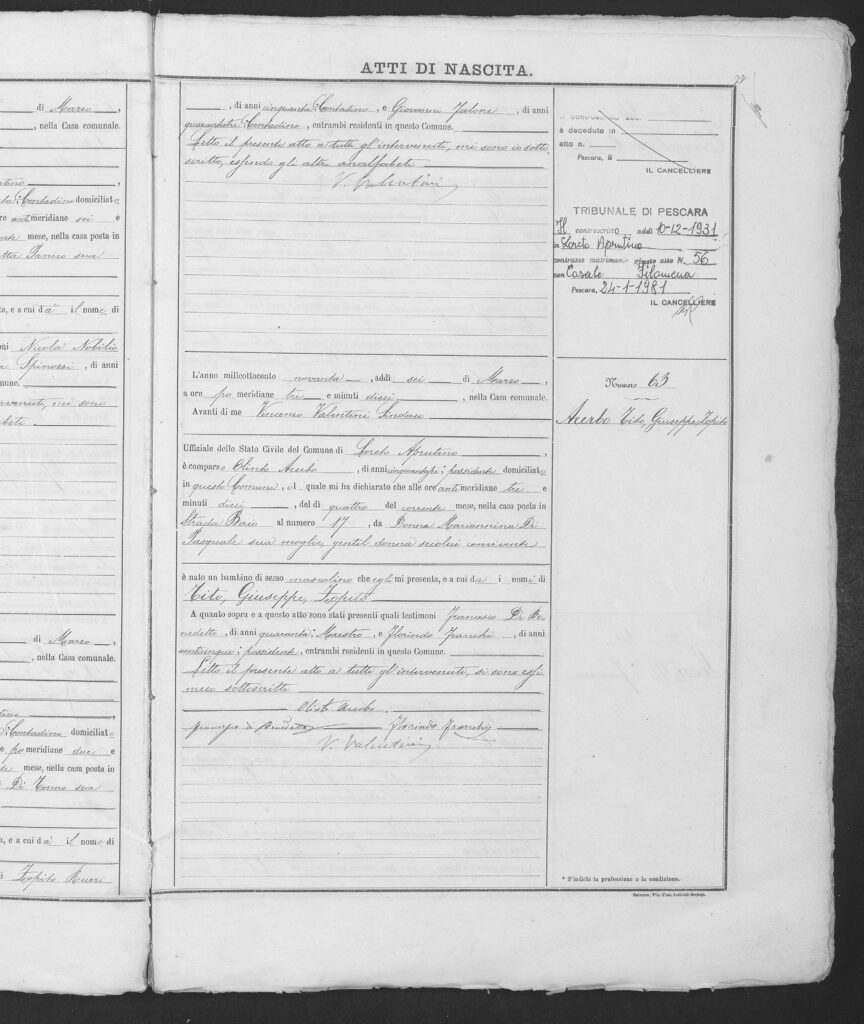Tito (1890-1918) e Giacomo (1888-1969) Acerbo
Tito Giuseppe Zopito Acerbo was born in Loreto Aprutino (PE) on 4th March 1890, to Olinto and Marianna De Pasquale.
Having received his initial education at the archiepiscopal seminary in Chieti and the royal high school in Fermo, he graduated in Florence and then enlisted as a volunteer in the army at the outbreak of the First World War.
For his skills in the field and deep sense of duty, he was promoted to Captain, being decorated with two silver medals for military valour. But it was his charisma and sense of sacrifice on the night of 15 June 1918 that earned him the Gold Medal of Remembrance, when, although wounded, he was one of the key figures in blocking the Austro-Hungarian enemy’s attempt to penetrate the Piave River.
He died in the field the next morning, 16th June 1918.
His brother Giacomo Vincenzo Aurelio was born in Loreto Aprutino (PE) on 25th July 1888.
He too completed his classical studies between Chieti and Fermo, while he graduated in Agricultural Sciences in Pisa in 1912.
He, too, completed his classical studies in Chieti and was active in the communal life of his town until he enlisted in the army as a volunteer, distinguishing himself in numerous battles for which he was decorated several times. while he received a degree in Agricultural Sciences from the University of Pisa in 1912. When Titus died, he was discharged.
From there, he devoted himself to a university and political career. First approaching the socialists and then favouring the birth of the Fascio provinciale di combattimento in the province of Teramo, obtaining increasingly important coordinating positions.
In 1921, he was elected to Parliament and in 1923 he linked his name to the well-known ‘Acerbo Law’, which aimed to reform the electoral system according to a majority principle.
During his political career he was Undersecretary of State to the Prime Minister’s Office (1922-24), Vice-President of the Chamber of Deputies (1929), Minister of Agriculture and Forestry (1929-1935), Minister of Finance (1943).
In 1942, he voted for the removal of Mussolini’s powers, calling himself the ‘humble servant of the king’ Victor Emmanuel III. However, when the armistice was signed on 8th September 1944, he was sentenced to death in absentia, but managed to escape, taking refuge in his birthplace in Loreto Aprutino.
After months on the run, he was arrested and sentenced to 48 years in prison.
He served a short time in the prison on the island of Procida, where he taught mathematics to inmates. When his sentence was overturned, he was freed, readmitted to vote and rehabilitated as a university lecturer, to which he devoted the last years of his life, working on numerous writings on economics and agrarian policy.
Giacomo Acerbo died in Rome on 9th January 1969.
The story of the two brothers is closely linked to the famous ‘Coppa Acerbo’, which Giacomo wanted to inaugurate in 1924 and named in memory of Tito, who died prematurely in the war. It was one of the most important car races of the time, a very difficult circuit through the hills of Pescara in which the most famous names of car manufacturers took part. The last edition was held in 1961.
You can consult birth certificates on the Ancestors Portal.
For Tito Acerbo: Archivio di Stato di Pescara, Stato civile italiano, Loreto Aprutino, 1890
For Giacomo Acerbo: Archivio di Stato di Pescara, Stato civile italiano, Loreto Aprutino, 1888
The originals are preserved at theState Archives of Pescara
For more on the figure of Giacomo Acerbo, see the entry of the Biographical Dictionary of Italians edited by Antonio Parisella.

